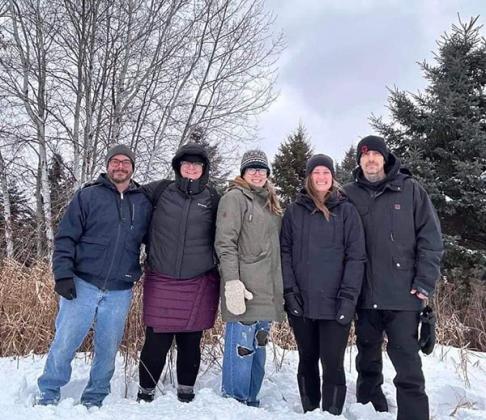Taproot Community Farm's founding board members from left, Jason Wendt, Jeri Wendt, Martha Rypstra, Jennifer Schulist and Aaron Schulist. Submitted photo.
BY VICKI BROWNE
Martha and Luke Rypstra, originally from Minnesota, Jeri and Jason Wendt from lower Michigan, and Jennifer and Aaron Schulist from Wisconsin, have combined their skills and passions to create Taproot Community Farm. Taproot, a 501c3 nonprofit, is “an educational farm dedicated to food sustainability and security for Iron County,” according to the organization’s Facebook page.
Taproot’s first open board meeting occurred on Friday, Jan. 5 at the Windsor Center. Approximately 30 interested residents attended.
“[Starting a community farm] has been a two year journey,” said Martha Rypstra, president, at the board meeting. “And we want Taproot Community Farm to be here seven generations from now, making access to healthy food easier for everyone.”
In 2022 Rypstra led a class as part of the Windsor Center’s summer programming to build a pollinator garden at West Iron County school. In 2023, she and Jeri Wendt attended a community garden class at Partridge Creek Farm in Ishpeming and then approached the City of Iron River about converting a vacant lot on Genesee Street into a pocket park. Support from the city’s beautification committee as well as local businesses and residents turned the space into a mini food forest with fruits, vegetables and flowers.
“We had so many partners within the city,” Rypstra told the Reporter. “Barrels, plants and picnic tables were donated. People weeded and watered and were able to harvest tomatoes, cabbages, broccoli and beans.”
Rypstra and Wendt felt that the community’s engagement with the pocket park was a strong indicator that a larger endeavor could be successful. They approached the city to see if Iron River would sell them a parcel for $1. After looking at several sites, the city agreed unanimously at the Nov. 8 city council meeting to sell the 25 acre parcel on Stambaugh Avenue behind the Hillside Apartments to the group.
“We are beyond excited and grateful to see this project occur in our city,” Iron River City Manager Rachel Andreski told the Reporter. “This enthusiastic and dedicated group has vision, heart, passion, commitment and grit to see it through. This is a great way to bring our community together. We encourage everyone to get involved, as many hands make light work.”
The group has big plans for the site which include:
• large beds for growing fruits, vegetables and herbs
• large-scale composting
passive solar greenhouses along the treeless, south-facing slope of the land
• a food forest with fruit and nut trees, shrubs, herbs, vines and perennial vegetables that grow interdependently and are self-sustaining
• structures that provide spaces for activities including hydroponic growing, classes on all aspects of healthy eating, sustainable farming and FDA/CSA certification, and farmers’ markets
The first priority, however, is to clear trash and other debris from the site.
“This land was a drive-through area between two mining pits,” Wendt said. “It needs a lot of love.”
The invasive buckthorn on the site will need to be cleared, most likely with help from the conservation district. Piles that might be construction materials will need to be assessed. Old barbed wire fences (that might have been installed in the 1930s when residents brought their dairy cows over to graze) will also need to be removed.
“We don’t know what the quality of the soil is,” Rypstra added. “In the spring we’ll be able to do soil testing and contaminant assessments. We may have to amend the soil or use raised or capped beds, but we have the ability and knowledge to do what is needed.”
The group also needs to construct driveways at the north and south entrances to the parcel. Once driveways are in place, composting services can get underway.
“Good soil is our foundation,” Wendt said during the interview. “When I moved here I wanted to start a municipal composting service, but this is way better.”
Wendt is going to manage the composting undertaking which will provide revenue for Taproot.
“We don’t want to drain the community with fundraisers,” Rypstra indicated at the board meeting. “Composting services will provide the funding that sustains activities at the farm.”
Rypstra’s husband Luke is creating the Taproot website, where residents will be able to sign up for compost collection.
“Nearly 50% of household waste is compostable,” Wendt said. “There will be a fee for compost collection, but it will be less than it would cost if those things went into the trash for pick-up.”
Items to compost include
• Wood chips, mulch and sawdust
• Grass clippings, garden trimmings, leaves and twigs
• Clay
• Uncoated boxes, shredded non-colored paper, compostable plates
• Animal manure (not from dogs, cats or humans)
• Food scraps like vegetable peels, fruit cores, coffee grounds and eggshells (no meat or dairy)
The group plans to make more information available on the Taproot Community Farm website once it goes live.
“The city currently hires a company to haul away leaves, grass and brush from our spring and fall clean-ups,” Andreski said. “Partnering with Taproot will be a cost savings to the city.”
Wendt is eager to partner with tree services, flooring mills, loggers, landscapers and other municipalities in addition to residents who can feel good about cutting down on the amount of garbage that goes to landfills while returning valuable nutrients to the land through composting.
“We need a community farm,” Rypstra said. “It’s heart-wrenching when families cannot fill the cupboard with healthy food. This is for the community and even though we might not be originally from here, we have gotten so much support and encouragement. Even the old timers say, ‘Good for you, newcomers. Let’s see what you can do.’”
Updates about Taproot Community Farm can be found on the organization’s Facebook page. Taproot can also be reached via email at taprootcommunityfarm@gmail.com.


